|
|
|
Sort Order |
|
|
|
Items / Page
|
|
|
|
|
|
|
| Srl | Item |
| 1 |
ID:
167638
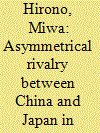

|
|
|
|
|
| Summary/Abstract |
To what extent is China–Japan rivalry a global phenomenon, and what is the nature of the rivalry they engage in outside their own region? Literature on Sino-Japanese rivalry abounds, but it pays scant attention to the relevance of the rivalry outside East Asia. This article argues that Sino-Japanese rivalry has indeed become a global phenomenon, that various forms of the rivalry are evident in Africa, and that they are mostly of an asymmetrical nature. Quantitatively, China’s contribution to Africa is far greater than that of Japan, with the exception of foreign direct investment (FDI). Qualitatively, though, Japan has a stronger sense of the rivalry than China has, revealing a psychological aspect to the asymmetry as well. Contextually, the types of activity that Chinese and Japanese actors carry out in Africa are not necessarily the same, which makes the rivalry all the more asymmetrical. The rivalry has become more apparent recently, not only because of the rise of China but also because of a change in the meaning of ‘Africa’ – from a region of ‘poverty’ and ‘hunger’ to a region of ‘economic opportunities’. That said, Africa – to a greater or lesser degree in each of its countries – still suffers from conflict and instability. As a result, the ability of Japan and China to exert power and influence throughout Africa is somewhat restricted.
|
|
|
|
|
|
|
|
|
|
|
|
|
|
|
|
| 2 |
ID:
189257
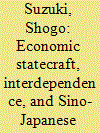

|
|
|
|
|
| Summary/Abstract |
China’s increasingly active economic diplomacy in recent years has often been deeply linked to its geostrategic interests. Japan is said to be watching this development with alarm. Analysts have often claimed that this has resulted in Sino-Japanese rivalry, where the Japanese see any gains made by China in zero-sum terms, and make concerted efforts to counter China’s growing influence. This article, however, is critical of such views. While elements of rivalry may indeed be visible in some aspects of Sino-Japanese relations, it would be premature to apply this perspective to economic statecraft, which is inherently multifaceted. This article claims that too much attention has been paid to the strategic aspects of Chinese economic statecraft at the expense of economic/commercial ones that could foster cooperative relations between Beijing and Tokyo. It argues that Japan does not hold a monolithic view that Chinese diplomatic activities in the economic realm are an axiomatic threat to Japanese security interests, and it remains premature to say that Japan and China are ‘rivals’ in the realm of economic statecraft. Future analysis in this area needs to pay greater attention to the complicating effects that economic interdependence can have in strategic policies.
|
|
|
|
|
|
|
|
|
|
|
|
|
|
|
|
| 3 |
ID:
164966
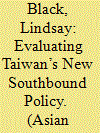

|
|
|
|
|
| Summary/Abstract |
Critiques of Taiwanese President Tsai Ing-wen’s New Southbound Policy overemphasize Beijing’s ability to hinder what is essentially a rational economic move that was already underway prior to Tsai’s inauguration. China’s antagonistic stance toward the New Southbound Policy merely pushes Taiwan into the hands of Japan, China’s regional rival.
|
|
|
|
|
|
|
|
|
|
|
|
|
|
|
|
| 4 |
ID:
133967
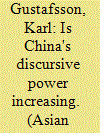

|
|
|
|
|
| Publication |
2014.
|
| Summary/Abstract |
The idea that China's rise, and more specifically its increased material capabilities, are about to produce a power shift in East Asia raises the question whether the Chinese government's ability to produce effects through discursive power has also increased. The government's use of discourses about China's war against Japan is a conspicuous example of attempts to exercise discursive power. Has China's ability to use the past for political purposes increased as its material capabilities have grown? To answer this question, I theorize on the use of discourses about the past on three levels-domestic, bilateral, and international. My analysis demonstrates that notwithstanding its increased material capabilities, the Chinese government's discursive power has actually decreased.
|
|
|
|
|
|
|
|
|
|
|
|
|
|
|
|
| 5 |
ID:
189324
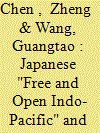

|
|
|
|
|
| Summary/Abstract |
This article examines the Chinese assessment of and responses toward the Japanese "Free and Open Indo-Pacific" (FOIP) concept against the background of evolving Sino-Japanese relations. Addressing both its security and economic concerns, the FOIP is Tokyo's top-level regional strategy design in the context of China's rise. The development of the Japanese FOIP has been fluctuating with the evolution of Sino-Japanese relations and the emerging Sino-U.S. strategic contest over the past decade. The complexity and the fluid nature of the Japanese FOIP has prompted varying assessments and policy recommendations among Chinese analysts, which can be roughly divided into three categories: the hardline approach, the hedging approach, and the docking approach. Meanwhile, remarks of Chinese officials on the Japanese FOIP remain elusive, carefully differentiating between the Indo-Pacific strategy of the United States and that of Japan. All of these aspects reveal the complexity and flexibility of China's policies. The COVID-19 pandemic and the recent domestic changes of Japan and the U.S. have further complicated geopolitical and geoeconomic tensions. As a consequence, the Sino-Japanese relationship has become awkward once again.
|
|
|
|
|
|
|
|
|
|
|
|
|
|
|
|
| 6 |
ID:
178888
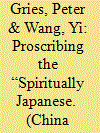

|
|
|
|
|
| Summary/Abstract |
In spring 2018 China, indignant popular nationalists demanded that the “spiritually Japanese” activities of a fringe group of young Chinese who figure themselves as Japanese be proscribed. The National People's Congress quickly complied, passing legislation that made it illegal to “beautify the war of invasion.” Exploring how and why the Chinese Communist Party (CCP) responded to the demands of popular nationalists, we suggest that authoritarian representation occurs in China even beyond the bounds of everyday apolitical issues like education and healthcare. Indeed, because the CCP relies upon a nationalist claim to legitimate rule, authoritarian legislators may respond to the public on politically sensitive issues like nationalism as well. Journalists and lawyers, furthermore, can play a vital mediating role between elites and masses, facilitating the transmission of the information and expertise needed for authoritarian responsiveness. Implications for our understanding of Chinese nationalism, authoritarian responsiveness and state legitimation in China today are discussed.
|
|
|
|
|
|
|
|
|
|
|
|
|
|
|
|
| 7 |
ID:
082388
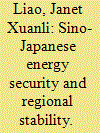

|
|
|
|
|
| Publication |
2008.
|
| Summary/Abstract |
The Sino-Japanese dispute over the East China Sea maritime resources was triggered by the unsettled maritime boundary and the territorial dispute over the Diaoyu/Senkaku Islands. The dispute has been ascribed by many to intensified competition between China and Japan over energy supply. However this article attributes the fundamental cause of the conflict to power politics and political distrust, which are deemed to have the key role in preventing the two governments from finding a solution. The article analyses the origin and the causes responsible for the Sino-Japanese dispute over the East China Sea gas exploration, and then proceeds to investigate the diplomatic dialogues to reveal the key obstacles in the process.
|
|
|
|
|
|
|
|
|
|
|
|
|
|
|
|
| 8 |
ID:
086404
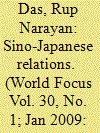

|
|
|
|
|
| Publication |
2009.
|
| Summary/Abstract |
In the emerging strategic scenario in the world and Asia in paricular, the Indo-US nuclear deal and India' strategic partnership with the USA had its resonance on Sino-Japanese relations as well, particularly on China. What had added grist to the quadrilateral relations among the USA, Japan, China and India is the signing of the India-Japan Security declaration during the visit of Indian Prime Minister Manmohan Singhto Japan in October 2008.
|
|
|
|
|
|
|
|
|
|
|
|
|
|
|
|
| 9 |
ID:
184144
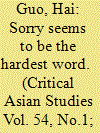

|
|
|
|
|
| Summary/Abstract |
Conventional arguments understand history-related disputes between Japan and China to be a result of identity politics that revolve around very different interpretations over the historical legacies of WW II. This article challenges these conventional arguments. It shows that history-related disputes between the two sides have less to do with identity politics than with efforts by the Chinese government to deflect domestic discontent over its 1972 decision to waive reparations claims against Japan in return for the Japanese government apologizing for Japan’s actions in WW II. But this tacit arrangement, “the 1972 System,” began to fall apart in the early 1980s. This is because it failed to establish a clear institutional framework that could provide historical justice to Chinese citizens for the actions of the Japanese military in China, embroiled the Chinese government in a chronic legitimacy deficit that can only be mitigated if Japan keeps apologizing, and perpetuated Japan’s victimizer identity, which the Japanese public has found emotionally unacceptable. The result is the transformation of what originally was a domestic controversy in China over historical justice into a diplomatic dispute with Japan over historical understanding.
|
|
|
|
|
|
|
|
|
|
|
|
|
|
|
|
| 10 |
ID:
165985
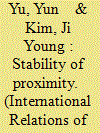

|
|
|
|
|
| Summary/Abstract |
The Senkaku/Diaoyu dispute, a territorial dispute between Japan and China, has long been regarded as a ticking bomb, capable of blowing up the already volatile Sino-Japanese relations at any time. Would the differences over the islands lead China and Japan into major military confrontations, if not all-out war? This article argues that there is cause for optimism and that the Sino-Japanese relationship has displayed a remarkable level of resiliency through the years. In examining the three major diplomatic crises of 2004, 2010, and 2012 (and beyond) surrounding the Senkaku/Diaoyu dispute, this article shows that Japan and China have successfully engaged in bilateral crisis management by operating political, diplomatic, and military exchanges to prevent further escalation. Our analysis calls for a more informed and balanced view within academic discourse, so as to encourage accurate threat perceptions between China and Japan, mitigate the security dilemma, thereby eventually fulfilling the optimistic theory.
|
|
|
|
|
|
|
|
|
|
|
|
|
|
|
|
| 11 |
ID:
172424
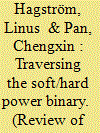

|
|
|
|
|
| Summary/Abstract |
Soft power and hard power are conceptualised in International Relations as empirically and normatively dichotomous, and practically opposite – one intangible, attractive, and legitimate, the other tangible, coercive, and less legitimate. This article critiques this binary conceptualisation, arguing that it is discursively constructed with and for the construction of Self and Other. It further demonstrates that practices commonly labelled and understood as soft power and hard power are closely interconnected. Best understood as ‘representational force’ and ‘physical force’ respectively, soft and hard power intertwine through the operation of productive and disciplinary forms of power. We illustrate this argument by analysing the Sino-Japanese dispute over the Diaoyu/Senkaku Islands. Both governments exercise representational force in constructing their respective versions of events and Self/Other. The soft/hard power binary itself plays a performative role as the Self is typically associated with soft power and the Other with hard power. The operation of productive power, moreover, privileges the attractiveness of the former and the repellence of the latter, and disciplinary power physically enforces these distinctions on subjects in both states. Finally, reinforced Self/Other distinctions legitimise preparations for violence against the Other on both sides, thus exposing how fundamentally entangled soft and hard power are in practice.
|
|
|
|
|
|
|
|
|
|
|
|
|
|
|
|
| 12 |
ID:
101631
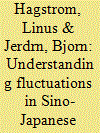

|
|
|
|
|
| Publication |
2010.
|
| Summary/Abstract |
From the late 1990s to the late 2000s, scholarly literature and media analysis shifted from representing the Sino-Japanese relationship as generally "good," to portraying it as generally "bad," and then back to describing it as generally "good" again. This article aims to make sense of what could thus be construed as fluctuations in Sino-Japanese relations and Japan's China policy, through employing discourse analysis as foreign policy theory. The aim is operationalized by analyzing Japanese China discourse as it has played out in the Diet. The article demonstrates that there is a fault line between a "radical representation," epitomizing further politicization of a prevalent Japanese sense of insecurity about China, and a "moderate representation," reflecting de-politicization of the same phenomenon. Furthermore, it shows that in the period examined (a) China has come to be discussed more frequently, and (b) a greater variety of aspects of the relationship have reached the political agenda. Together, these two changes have been conducive in altering the relative position of the two representations. In 2008 the moderate representation was still dominant, but less so than in 1999. The main argument of this article is thus that recent fluctuations in Japan's China policy-and by implication Sino-Japanese relations-can be understood in terms of an increasingly open Japanese China discourse.
|
|
|
|
|
|
|
|
|
|
|
|
|
|
|
|
| 13 |
ID:
170378
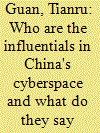

|
|
|
|
|
| Summary/Abstract |
This research note explores an increasingly prominent, but often neglected, communication group in China's cyberspace—the online “influential” (big Vs or verified users)—who shape public perceptions, including on foreign policy issues. Examining threads on Sino-Japanese relations on Weibo reveals a diverse ecosystem that includes not only established media agencies and government agencies, but public intellectuals, whose role and presence are quite central. An analysis of the content of posts finds that influentials have similarly diverse viewpoints on Sino-Japanese relations; some have broken with the conflict-focused discourses that have prevailed on Weibo, reflecting a competing narrative espousing the need for greater pragmatism towards Japan. The findings call into question the argument that social media necessarily trends toward greater nationalism.
|
|
|
|
|
|
|
|
|
|
|
|
|
|
|
|
|
|
|
|
|